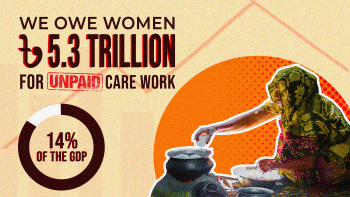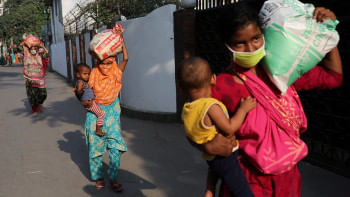The invisibilisation of women’s labour during Eid

As the auspicious Eid al-Adha approaches, I find a faint sense of dread seeping into the corner of my mind. Instead of exhibiting a festive spirit, my mind is busy calculating the enormous amount of work I have to do on Eid and how it will leave me too exhausted to enjoy the little break from my studies and tedious job. Since the last couple of years, I have developed a complicated relationship with festivals, especially Eid. Days which used to be filled with dressing up in new clothes, eating delicious dishes and calculating salami at the end of the day are now replaced by my share of cleaning responsibilities and cooking preparations. It fills me with both gratitude and sadness for my mother who, for years, toiled away in the kitchen all day.
Amidst the festive celebrations, exquisite dishes and beautiful decorations, most of us often overlook the strenuous invisible labour of women. Our festivals are largely celebrated on the back of women's labour. Historically, the task of cleaning, decorating the house and cooking a myriad of dishes fell on women. The home, the private sphere, has traditionally been thought of as women's domain and certain activities such as cooking and cleaning are considered commonly as feminine roles. Women spent the majority of their time doing household chores and care work. A survey by the Bangladesh Bureau of Statistics (BBS) published in 2021 found women spending 25 percent of their daily time on care work while men spend only 3.3 percent of their time doing the same. Such disparity creates a "leisure gap" between men and women. Women's work at home is devalued by the state as well as their contribution is unacknowledged in Gross Domestic Product (GDP). According to a 2019 report by Bangladesh Bureau of Statistics (BBS) in 2019, women are involved in unpaid work 3.5 times more than men. Such disproportionate statistics of unpaid work indicates women's deprioritisation both in the private and public spheres.
Gender roles prescribed by the patriarchy become more pronounced through women's sole contribution in household activities during festivals. For others, festivals like Eid are a time to munch on delicious foods and go out with their friends. But for most women, this is a rather stressful time. From worrying over which dishes are to be cooked and how the house must be cleaned and other nitty-gritty details, women have to manage everything by themselves which is both physically and mentally taxing. Besides, in many families, women are made to follow particular customs and prepare everything accordingly, without any question, due to the fear of abuse which impacts their health both physically and psychologically.
Eid is even more anxiety-ridden for women who are involved in formal work as they have to manage work both outside and at home. Arlie Hochschild in her book The Second Shift: Working Parents and the Revolution at Home published in 1989 discusses how the quotidian practices of men and women are vastly different and women have to work a second shift at home after slaving away all day at their formal workplace. The added burden of work during Eid and other festivals creates a "triple burden" for working women. During a conversation with a friend of mine on this topic, she said her mother has to take leaves from her workplace in preparation for festivals because time is never sufficient when you're the only one making plans, budgets, shopping, cooking, and every other aspect associated with celebrations. Such cases are commonplace across the country both in urban and rural places.
The tendency to pedestalise and mythologise women as "superhumans" is another element of women's double burden. It's socially expected of women to not only manage both worlds but also to make it look effortless. She has to smile while greeting guests at home, no matter how exhausted she is from cooking and performing other duties all day. Marketing campaigns like ghor samlai, byabshao samlai also goes on to intensify such beliefs.
There's a certain undertone to the imposed work on women during festivals which makes it seem like performing a choreographed dance: cooking a number of dishes, cleaning the house, keeping a happy face despite the discernible exhaustion she feels. To be a woman is to master the art of performing at all times. Eid becomes less of a holiday and more of a cause of insurmountable stress for them. This Eid, let's make individual efforts to do our share of housework so that it can be a joyous time for everyone.
Nawshin Flora is a writer based in Dhaka. Find her at [email protected]
Views expressed in this article are the author's own.
Follow The Daily Star Opinion on Facebook for the latest opinions, commentaries and analyses by experts and professionals. To contribute your article or letter to The Daily Star Opinion, see our guidelines for submission.

 For all latest news, follow The Daily Star's Google News channel.
For all latest news, follow The Daily Star's Google News channel. 










Comments